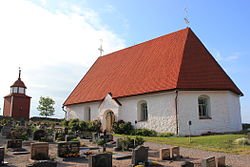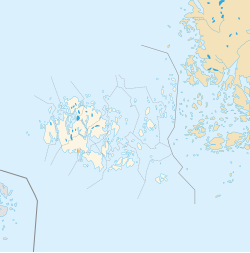Kökar () is an island municipality to the south-east of the Åland archipelago, Finland.
Kökar | |
|---|---|
Municipality | |
| Kökar kommun | |
 Church of Saint Anne | |
 Location of Kökar in Finland | |
| Coordinates: 59°55.2′N 020°54.5′E / 59.9200°N 20.9083°E | |
| Country | |
| Region | Åland |
| Sub-region | Archipelago sub-region |
| Government | |
| • Municipal manager | Kurt Forsman |
| Area (2018-01-01)[1] | |
• Total | 2,165.02 km2 (835.92 sq mi) |
| • Land | 63.58 km2 (24.55 sq mi) |
| • Water | 2,101.46 km2 (811.38 sq mi) |
| • Rank | 305th largest in Finland |
| Population (2024-10-31)[2] | |
• Total | 226 |
| • Rank | 308th largest in Finland |
| • Density | 3.55/km2 (9.2/sq mi) |
| Population by native language | |
| • Swedish | 87.1% (official) |
| • Finnish | 9.3% |
| • Others | 3.6% |
| Population by age | |
| • 0 to 14 | 3.1% |
| • 15 to 64 | 58.7% |
| • 65 or older | 38.2% |
| Time zone | UTC+02:00 (EET) |
| • Summer (DST) | UTC+03:00 (EEST) |
| Website | www.kokar.ax |
It is also one of the municipalities of Åland. It is reachable by boat from Långnäs on Åland or from Galtby with access to mainland Finland.
The municipality has a population of 226 (31 October 2024)[2] and covers an area of 2,165.02 square kilometres (835.92 sq mi) of which 2,101.46 km2 (811.38 sq mi) is water.[1] The population density is 3.55 inhabitants per square kilometre (9.2/sq mi).
The municipality is unilingually Swedish (with about %10 Finnish-speaking). The natural reserve of Östra Långskär is located there. Other notable islands include Kyrkogårdsö.
Ulla-Lena Lundberg, a Finnish author, was born in Kökar in 1947.
History
editKökar was first inhabited over 3,000 years ago by seal hunters. A Franciscan monastery was founded in Hamnö in the 15th century. Today the monastery is in ruins. The church dedicated to St. Anne was built in 1784 in the place of the old monastery church.
Sights
editThe church of St. Anne was built in the site of the old monastery church during the reign of king Gustav III and is located on the island of Hamnö. It is next to the ruins of the monastery. The belltower was built in the 19th century. The belltower had to be restored after an Autumn storm damaged it in 1978. A model of a sailing ship hangs in the church. It was given by a local sailor who had been captured by North African pirates but who later managed to escape. The model has 64 cannons.
The local museum was opened in 1988 and its purpose is to show how the people of Kökar lived in the 19th century and onwards to the 1940s. The now museum building, built in 1913, used to be an old school.[citation needed]
There is also a Bronze Age site dating back to 1150–1050 BC. It was found in 1918.[citation needed]
References
edit- ^ a b "Area of Finnish Municipalities 1.1.2018" (PDF). National Land Survey of Finland. Retrieved 30 January 2018.
- ^ a b c "Finland's preliminary population figure was 5,635,560 at the end of October 2024". Population structure. Statistics Finland. 19 November 2024. ISSN 1797-5395. Retrieved 22 November 2024.
- ^ "Population according to age (1-year) and sex by area and the regional division of each statistical reference year, 2003–2020". StatFin. Statistics Finland. Retrieved 2 May 2021.
- ^ a b "Luettelo kuntien ja seurakuntien tuloveroprosenteista vuonna 2023". Tax Administration of Finland. 14 November 2022. Retrieved 7 May 2023.
External links
editMedia related to Kökar at Wikimedia Commons
- Municipality of Kökar – Official website (in Swedish)
- The museum of Kökar's web site

